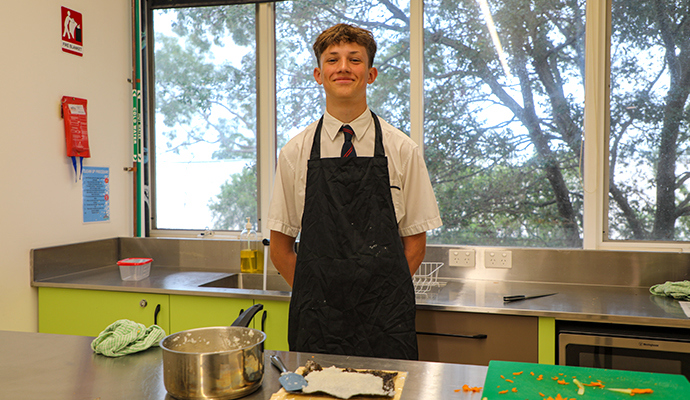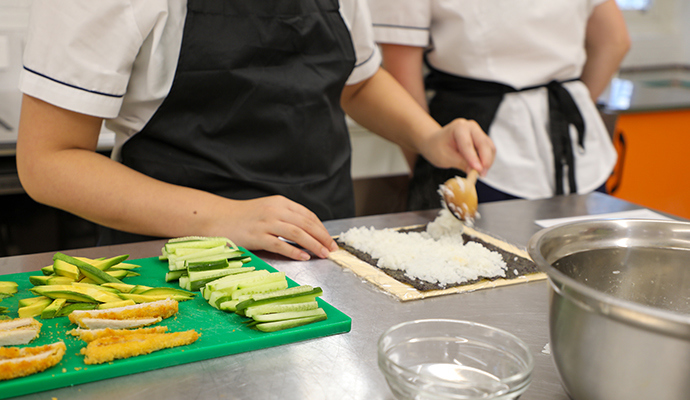The Australian food industry is growing in importance, providing numerous employment opportunities and increasing the relevance of Food Technology for the individual and society. There are increasing community concerns about food issues, including hygiene and safety, nutritional claims and the nutritional quality of food, genetic engineering, functional foods, ethical and sustainable food sourcing, and the environmental impact of food-production processes.
Food habits change based on economic, social, cultural, technological, and environmental factors. In Australia, because of rapid technological change, consumers are confronted with an increasing array of food products designed to complement our changing lifestyles. Making informed food decisions requires an explicit understanding of nutrition principles in both theory and practice, and this is embedded in the study of Food Technology.
Making informed food decisions requires an explicit understanding of nutrition principles in both theory and practice, and this is embedded in the study of Food Technology. This is essential to the development of sound food habits and contributes significantly to the wellbeing of all Australians.
The study of Food Technology in Years 9 and/or 10 provides students with the opportunity to make informed decisions based on knowledge and understanding of the impact of food on society, of food properties, preparation and processing, and the interrelationship of nutrition and health. This understanding enables them to design, manage and implement solutions, in a safe and hygienic manner, for specific purposes with regard to food.
The Year 11 Food Technology course covers a broad spectrum of topics, including food availability, selection, safety, and nutrition’s role in health along with socio-economic aspects. It provides an in-depth understanding of the Australian food industry’s structure, production practices, and food product development. The course equips students with research, analysis, and communication skills, and involves a range of practical activities. They also develop skills in applying design methodology, research techniques, visual and written communication, and practical skills to prepare, cook, and serve food.
Contact
Head of Department: Darren Woodrow
Email: dwoodrow@barker.nsw.edu.au


Year 9
Students studying Food Technology in Year 9 apply skills and gain confidence in managing, making and evaluating solutions for specific food preferences and diets.
Students in Year 9 will learn about Food Technology in the following Focus Areas:
• Food in Australia
• Food Equity
• Food for Special Occasions
Students are provided with opportunities to develop practical skills in preparing and presenting food to enable them to select and use appropriate ingredients, methods and equipment. They are also provided with a broad knowledge and understanding of food properties, processing and preparation methods. These skills are transferable to other study, work and life contexts that students may encounter.
Year 10
Students studying Food Technology in Year 10 build on the skills learnt and gain further confidence in managing, making and evaluating solutions for specific food preferences and diets.
Students in Year 10 will learn about Food Technology in the following Focus Areas:
- Food for Specific Needs
- Food Service and Catering
- Food Trends
Students are provided with opportunities to develop practical skills in preparing and presenting food to enable them to select and use appropriate ingredients, methods and equipment. They are also provided with a broad knowledge and understanding of food properties, processing and preparation methods. These skills are transferable to other study, work and life contexts that students may encounter.
Year 11
Stage 6 Food Technology
The syllabus for Stage 6 Food Technology is about food needs and wants. It covers food availability, selection, safety, and nutrition’s role in health and socio-economic aspects. It includes the structure of the Australian food industry, production practices, and food product development. The course helps students develop skills in research, analysis, and communication. Practical activities are carried out during the course.
Students will understand:
- Sectors of the Australian food industry
- Policies and legislation in the food industry
- Factors influencing food availability
- Factors impacting food quality
- Food product design and the design process
- Manufacturing processes
- Nutrition
- Food preparation skills, techniques, and processes
- Menu design and presentation
- Sensory characteristics and functional properties of food
Students will develop skills in:
- Applying design methodology
- Research techniques
- Visual and written communication
- Practical skills to prepare, cook, and serve food
Assessment
- Task 1: Nutrition Report and Practical Evaluation
- Task 2: Food Quality Portfolio
- Task 3: Semester 2 Examination

